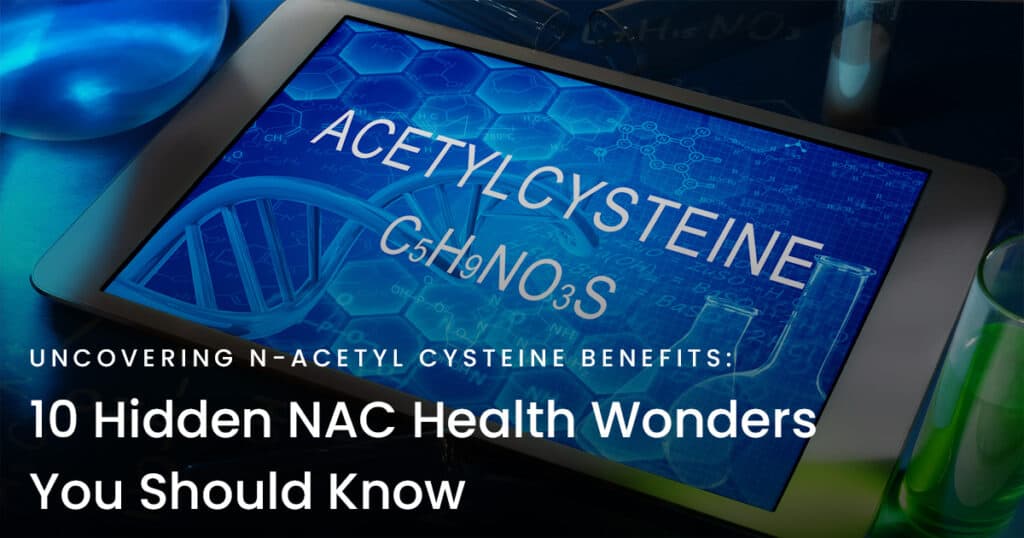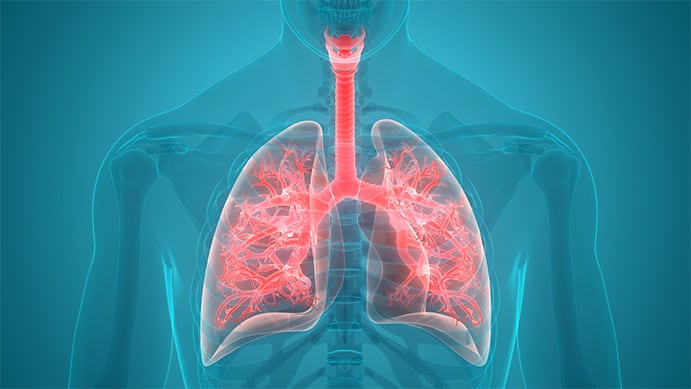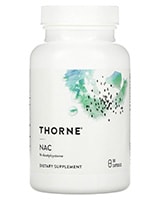

N-Acetyl Cysteine, commonly known as NAC, is a powerful supplement that has been gaining attention in the health and wellness world. This compound is a synthetic form of the amino acid cysteine[1]Goepp, J. (2010, May). N-acetylcysteine Protects Against Pulmonary Disease. Life Extension Magazine. https://www.lifeextension.com/magazine/2010/5/n-acetyl-cysteine, serves as a precursor to glutathione, one of the body’s most potent antioxidants. It plays a crucial role in various bodily functions, from detoxification to immune system support.
Interestingly, NAC holds a unique position in the world of supplements. While many supplements have claims based on traditional use or preliminary research, NAC has the distinction of being approved by the Food and Drug Administration (FDA) for certain medical uses. This approval lends a level of credibility to NAC that many supplements lack, making it a subject of interest for both researchers and health-conscious individuals alike.
In this article, we will look into the world of NAC, exploring its potential benefits, side effects, and precautions. We aim to uncover the hidden wonders of this remarkable supplement and provide a comprehensive guide for those considering adding NAC to their health regimen.
Understanding NAC
NAC is a synthetic form of the amino acid cysteine[2]Goepp, J. (2010, May). N-acetylcysteine Protects Against Pulmonary Disease. Life Extension Magazine. https://www.lifeextension.com/magazine/2010/5/n-acetyl-cysteine. Amino acids are the building blocks of proteins, playing a vital role in almost every biological process in our bodies. Cysteine, in particular, is classified as a semi-essential amino acid. This classification means that while our bodies can produce cysteine, we also need to obtain it from dietary sources to meet our needs fully.
Cysteine is found in most high-protein foods, including chicken, turkey, yogurt, cheese, eggs, sunflower seeds, and legumes[3]Goodson, A. (2018, September 26). Top 9 Benefits of NAC (N-Acetyl Cysteine). Healthline. https://www.healthline.com/nutrition/nac-benefits. For vegetarians or vegans, or those who don’t consume a lot of cysteine-rich foods, NAC supplements can be a valuable tool to ensure they’re getting enough of this crucial amino acid.
When we consume NAC, either through supplements or cysteine-rich foods, our bodies convert it into cysteine and then into glutathione, a powerful antioxidant. This conversion process, and the subsequent benefits of glutathione, are at the heart of many of NAC’s potential health benefits.
The Benefits of NAC
NAC has been the subject of numerous scientific studies due to its potential health benefits. While research is ongoing, and NAC should not be used as a replacement for medical treatment, it’s worth exploring the potential health benefits that this supplement can offer.
Acetaminophen Poisoning
One of the most well-established uses of NAC is in the treatment of acetaminophen (Tylenol) poisoning[4]Farrell, S. E., & Miller, M. A. (2021, October 5). Acetaminophen Toxicity Treatment & Management. Medscape. https://emedicine.medscape.com/article/820200-treatment. Acetaminophen is a common over-the-counter medication used for pain relief and to reduce fever. While generally safe at recommended doses, an overdose can lead to severe liver toxicity and failure, which can be fatal[5]Lefton, J. (2023, June 30). The Benefits of N-Acetylcysteine. Verywell Health. https://www.verywellhealth.com/the-benefits-of-n-acetylcysteine-89416.
In such cases, NAC has been approved by the FDA for use in preventing liver damage. It’s administered intravenously in a medical setting, often in three infusions for 21 hours. NAC works by replenishing the body’s stores of glutathione, an antioxidant that helps protect the liver from the harmful effects of acetaminophen overdose.
Lung Disease

NAC may also have benefits for individuals with certain lung diseases, such as chronic bronchitis and chronic obstructive pulmonary disease (COPD). Some studies have found that NAC can reduce the incidence and severity of flare-ups in people with COPD.
Furthermore, the FDA has approved inhaled NAC as an add-on treatment for helping break up mucus in lung conditions[6]Lefton, J. (2023, June 30). The Benefits of N-Acetylcysteine. Verywell Health. https://www.verywellhealth.com/the-benefits-of-n-acetylcysteine-89416. This can make it easier for individuals with these conditions to breathe and may improve their overall quality of life.
COVID-19 and Other Viral Illnesses
The antioxidant and anti-inflammatory properties of NAC have led to its use in clinical practice for people hospitalized with COVID-19. Some studies suggest that NAC supplementation can reduce disease progression, decrease the need for intubation, and lower the death rate[7]Shi, Z., & Puyo, C. A. (2020). N-Acetylcysteine to Combat COVID-19: An Evidence Review. Therapeutic Clinical Risk Management, 16..
However, it’s important to note that these findings are preliminary and larger, well-designed trials are needed to confirm these benefits. NAC has also been studied for its potential benefits in treating other viral illnesses, including influenza and respiratory syncytial virus (RSV).
Heart Disease

NAC may also have potential benefits for heart health. Oxidative stress, which occurs when there’s an imbalance of free radicals (unstable molecules) in the body, can damage cells and tissues, including those in the heart. By boosting the body’s levels of the antioxidant glutathione, NAC may help to reduce oxidative stress and, in turn, lower the risk of heart disease.
In one study, daily use of NAC was found to reduce hypertension (high blood pressure), a significant contributor to atherosclerosis, or plaque build-up in the arteries[8]Vasdev, S., Singal, P., & Gill, V. (2009). The Antihypertensive Effect of Cysteine. International Journal of Angiology, 18(1).. Furthermore, NAC may also reduce homocysteine levels in the blood. High levels of homocysteine have been associated with an increased risk of heart disease.
Male Infertility
Research has also explored the potential benefits of NAC for male fertility. Varicoceles, or enlarged veins in the scrotum and testicles, are a leading cause of male infertility. In one small study, men who took NAC before and after surgery to treat varicoceles had higher conception rates[9]Barekat, F., Tavalaee, M., Deemeh, M. R., Bahreinian, M., Azadi, L., Abbasi, H., Rozbahani, S., & Nasr-Esfahani, M. H. (2016). A Preliminary Study: N-acetyl-L-cysteine Improves Semen Quality following Varicocelectomy. International Journal of Fertility & Sterility, 10(1)..
While these findings are promising, more research is needed to confirm the benefits of NAC for male fertility and to understand how it might be used in treatment.
Polycystic Ovary Syndrome
NAC may also help alleviate symptoms of polycystic ovary syndrome (PCOS), a hormonal disorder common among women of reproductive age. A systematic review of several studies found that NAC improved ovulation and pregnancy rates in women with PCOS[10]CentreSpringMD. (No date). NAC: The Incredible Amino Acid for Your Lungs, Liver, and Longevity. CentreSpring MD. https://centrespringmd.com/nac-the-incredible-amino-acid-for-your-lungs-liver-and-longevity/. However, it did not improve other common symptoms of PCOS, such as menstrual irregularities or weight gain[11]Lefton, J. (2023, June 30). The Benefits of N-Acetylcysteine. Verywell Health. https://www.verywellhealth.com/the-benefits-of-n-acetylcysteine-89416.
Again, while these findings are promising, more research is needed to confirm the benefits of NAC for PCOS and to understand how it might be used in treatment.
Mental Health Disorders
NAC may also have potential benefits for mental health. Due to its anti-inflammatory properties and its ability to regulate the neurotransmitter glutamate, NAC has been explored as a potential treatment for various mental health conditions.
Preliminary research suggests that NAC supplements may be an effective add-on treatment for mood disorders, including major depressive disorder and bipolar disorder, obsessive-compulsive disorder (OCD), schizophrenia, and substance abuse disorders, especially involving cocaine and cannabis[12]Ooi, S. L., Green, R., & Pak, S. C. (2018). N-Acetylcysteine for the Treatment of Psychiatric Disorders: A Review of Current Evidence. Biomed Research International.. However, it’s important to note that NAC supplements should not be used as the sole treatment for any mental health disorders. Always consult with a healthcare provider before starting any new supplement regimen.
Neurological Diseases
NAC may also have potential benefits for neurological conditions. Due to its antioxidant and anti-inflammatory properties, NAC has been explored as a potential add-on treatment for several neurological conditions, including Parkinson’s disease, Alzheimer’s disease/dementia, multiple sclerosis, peripheral and diabetic neuropathy, and stroke rehabilitation[13]Shahripour, R. B., Harrigan, M. R., & Alexandrov, A. V. (2014). N-acetylcysteine (NAC) in neurological disorders: mechanisms of action and therapeutic opportunities. Brain and Behavior, 4(2)..
While these findings are promising, more research is needed to confirm the benefits of NAC for these neurological conditions and to understand how it might be used in treatment.
Inflammatory Bowel Disease
Inflammatory bowel disease (IBD) is a term that encompasses conditions characterized by chronic inflammation of the digestive tract, such as Crohn’s disease and ulcerative colitis. Oxidative stress is believed to play a role in these conditions, and antioxidant treatments like NAC have therefore been explored as potential treatments.
Preliminary research suggests that NAC supplements may help prevent relapses in individuals with IBD who are tapering off certain medications[14]Schwalfenberg, G. K. (2021). N-Acetylcysteine: A Review of Clinical Usefulness (an Old Drug with New Tricks). Journal of Nutrition & Metabolism.. However, more research is needed to confirm these findings and to understand how NAC might be used in the treatment of IBD.
Obstructive Sleep Apnea

Obstructive sleep apnea, a condition characterized by repeated interruptions in breathing during sleep, is considered a cause of inflammation and a risk factor for high blood pressure, stroke, and heart disease[15]Lefton, J. (2023, June 30). The Benefits of N-Acetylcysteine. Verywell Health. https://www.verywellhealth.com/the-benefits-of-n-acetylcysteine-89416. Some small studies have suggested that NAC supplements may help improve nighttime breathing and reduce snoring in individuals with sleep apnea[16]Lefton, J. (2023, June 30). The Benefits of N-Acetylcysteine. Verywell Health. https://www.verywellhealth.com/the-benefits-of-n-acetylcysteine-89416. However, more research is needed to confirm these findings and to understand how NAC might be used in the treatment of sleep apnea.
Side Effects and Precautions
Like all supplements, NAC is not without potential side effects. These are generally more common at high doses and can vary depending on the form of the supplement. Possible side effects from oral NAC supplements include:
- Nausea
- Vomiting
- Diarrhea
- Itching
- Skin redness
It’s worth noting that NAC supplements have a distinct smell, similar to rotten eggs, which may contribute to feelings of nausea and vomiting. Some forms of the supplement are designed to mask this taste, which could potentially reduce these side effects.
As with any supplement, it’s important to talk to your healthcare provider before starting NAC. This is especially true if you are pregnant, breastfeeding, or have a medical condition such as asthma or a bleeding disorder. Your healthcare provider can help determine whether NAC is safe for you based on your individual health history and current medications.
Dosage and Storage
The dosage of NAC can vary depending on the specific health condition it’s being used to treat. However, a common dosage for general health purposes is 600-1,200 mg per day. It’s always best to follow the instructions on the supplement label or the advice of a healthcare provider.
When it comes to storing NAC, it’s important to keep the supplement in a cool, dry place away from direct sunlight. The bathroom cabinet, which can become hot and humid, is not a good place to store NAC. Instead, consider storing it in a kitchen cabinet or pantry. Always make sure the lid is tightly sealed to prevent moisture from getting in.
Remember, proper storage is key to maintaining the effectiveness of NAC supplements. Improper storage can lead to degradation of the supplement, reducing its potency and effectiveness.
Conclusion
N-acetyl cysteine (NAC) is a powerful supplement with a wide range of potential health benefits. From its role in detoxifying the body and combating oxidative stress to its potential in managing a variety of health conditions such as lung disease, heart disease, mental health disorders, and neurological diseases, NAC is truly a hidden wonder.
However, as with any supplement, it’s important to remember that NAC is not a cure-all. While it can support overall health and well-being, it should not replace a balanced diet, regular exercise, and proper medical care. Always consult with a healthcare provider before starting any new supplement regimen, including NAC. They can provide personalized advice based on your specific health needs and conditions.
Indeed, NAC is a supplement worth considering for its numerous potential health benefits. As we continue to uncover more about this powerful amino acid derivative, it’s clear that NAC has a lot to offer in supporting our health and well-being.
Buy N-Acetyl Cysteine (NAC) Online Review Comparison Table
| Product | Company | Quantity | Price | Country | Website |
 N-Acetyl Cysteine | iHerb | 90 pills (500mg) | $28.00 |  Worldwide, AU | Visit Website >> |
References
| ↑1, ↑2 | Goepp, J. (2010, May). N-acetylcysteine Protects Against Pulmonary Disease. Life Extension Magazine. https://www.lifeextension.com/magazine/2010/5/n-acetyl-cysteine |
|---|---|
| ↑3 | Goodson, A. (2018, September 26). Top 9 Benefits of NAC (N-Acetyl Cysteine). Healthline. https://www.healthline.com/nutrition/nac-benefits |
| ↑4 | Farrell, S. E., & Miller, M. A. (2021, October 5). Acetaminophen Toxicity Treatment & Management. Medscape. https://emedicine.medscape.com/article/820200-treatment |
| ↑5, ↑6, ↑11, ↑15, ↑16 | Lefton, J. (2023, June 30). The Benefits of N-Acetylcysteine. Verywell Health. https://www.verywellhealth.com/the-benefits-of-n-acetylcysteine-89416 |
| ↑7 | Shi, Z., & Puyo, C. A. (2020). N-Acetylcysteine to Combat COVID-19: An Evidence Review. Therapeutic Clinical Risk Management, 16. |
| ↑8 | Vasdev, S., Singal, P., & Gill, V. (2009). The Antihypertensive Effect of Cysteine. International Journal of Angiology, 18(1). |
| ↑9 | Barekat, F., Tavalaee, M., Deemeh, M. R., Bahreinian, M., Azadi, L., Abbasi, H., Rozbahani, S., & Nasr-Esfahani, M. H. (2016). A Preliminary Study: N-acetyl-L-cysteine Improves Semen Quality following Varicocelectomy. International Journal of Fertility & Sterility, 10(1). |
| ↑10 | CentreSpringMD. (No date). NAC: The Incredible Amino Acid for Your Lungs, Liver, and Longevity. CentreSpring MD. https://centrespringmd.com/nac-the-incredible-amino-acid-for-your-lungs-liver-and-longevity/ |
| ↑12 | Ooi, S. L., Green, R., & Pak, S. C. (2018). N-Acetylcysteine for the Treatment of Psychiatric Disorders: A Review of Current Evidence. Biomed Research International. |
| ↑13 | Shahripour, R. B., Harrigan, M. R., & Alexandrov, A. V. (2014). N-acetylcysteine (NAC) in neurological disorders: mechanisms of action and therapeutic opportunities. Brain and Behavior, 4(2). |
| ↑14 | Schwalfenberg, G. K. (2021). N-Acetylcysteine: A Review of Clinical Usefulness (an Old Drug with New Tricks). Journal of Nutrition & Metabolism. |

Leave a Reply